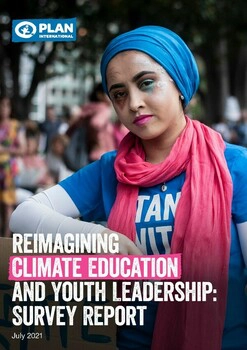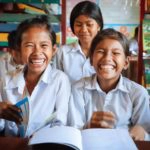Media Centre - 20 July 2021
Young people want urgent government action and better education on climate emergency – global survey

Eight out of 10 young people (82%) say they know nothing, very little or only a bit about their country’s climate policy, according to new research by Plan International.
In a survey of more than 1,800 adolescents and youth from 37 countries, an overwhelming majority (84%) of survey participants say their government’s efforts to include them in policies to tackle the climate emergency is insufficient, while only 6% think they are about right.
This is despite nearly all (98%) of those interviewed – all aged between 15 and 24 – being concerned about the climate emergency. Of these, three quarters (74%) say they feel very or extremely worried.
In Australia, 16-year old Plan International Australia youth activist Harleen said: “Education about climate change does not provide any practical action plans on how anxious and worried youth can make effective, long-lasting changes.”
“We, as the next generation, are being failed by not being equipped with the right resources to tackle the not-so-far away climate crisis- an existential crisis that is detrimental to not just youth, but all. The government needs to acknowledge there is a climate emergency and implement the very basis of nuanced education around this matter for more knowledgeable and sanguine students,” she said.
Almost nine in ten (86%) young people – whose views are published in the report Reimagining climate education and youth leadership – have taken action because of their fears.
The most common form of action was educating peers or family about climate issues (64%), signing or sharing a petition (49%) and posting about climate change on social media (45%). Just under one in five (18%) had joined a protest or strike.
But despite this, fewer than one in ten (6%) have participated in climate policy processes such as the COP UN Climate Change Conference. The UK government is hosting the COP26 summit in November, a key opportunity to meaningfully engage and listen to young people.
Most say their teaching at school has focussed on the impacts of climate change (90%) and individual actions such as recycling, saving energy and changing diets (73%) – but told Plan International that this often isn’t relevant to their day-to-day lives.
Only 22% have been taught about climate policies and frameworks, and only 11% have been taught how to participate in climate decision-making processes. About one in five (18%) rated their climate change education as poor or very poor.
Ahead of the Global Partnership for Education (GPE) Replenishment summit and COP26 conference on July 28th, Plan International is calling on governments worldwide to improve school teaching on the climate emergency, including placing greater emphasis on the social, political and human rights dimensions of the crisis.
It is also calling for more funding for girls’ education in the most climate exposed countries, including an ask for $5 billion at the GPE summit and through the Green Climate Fund.
Of the young people surveyed, 81% did not know where to find information on the Paris Agreement – the most recent legally binding international treaty on climate change, with a goal of limiting global warming to well below two degrees Celsius compared to pre-industrial levels.
Girls and young women were more likely to say they don’t feel confident participating in climate policy processes (29%), compared to boys and young men (20%).
“While everyone is affected by the consequences of climate change, Indigenous people are at the forefront of the climate crisis,” said Harleen. “Their deep connection to land and their ancestral heritage with the country will be diminished due to the rise of sea levels, increasing temperatures and relocation of communities from coastal areas.”
“The lack of intersectionality and consideration for marginalised communities when it comes to discourse about climate change is a problem that needs to be solved as First Nations peoples customs, preparation and implementation for managing the land is essential for tackling the climate crisis.” she said.
Nine in ten (92%) of those interviewed were either currently pursuing or have already completed secondary or university education.
Susanne Legena, CEO of Plan International Australia, said: “Educated girls become the leaders our planet needs. Educating girls is one of the most powerful solutions to creating a climate-just world. It has the ability to amplify all other solutions to climate change, and yet it continues to be overlooked by our global leaders and decision makers. How can we solve the world’s greatest crisis, but ignore the most powerful solution?
“As this global survey reveals, young people are fearful for their future and want to shape the policies and decisions that will define them, but often don’t feel informed or empowered enough to do so. This exposes significant shortfalls in how children and girls are learning about the environmental crisis we face.”
“This needs to change – governments worldwide must give young people, including and especially girls in their diversity, a greater say in how to tackle the climate emergency. When the world invests in girls’ education, we can unravel the practices and structures that are damaging our planet. We can unlock girls’ creativity, their power, their resilience and their leadership. Educated girls lift us all.”
Download the Survey report Reimagining climate education and youth leadership here
For further comment please contact Plan International Australia media and ambassador manager James Norman on 0451291775 or public relations advisor Claire Knox on 0452326549
About Plan International Australia
Put simply, we’re the charity for girls’ equality. We tackle the root causes of poverty, support communities through crises, campaign for gender equality, and help governments do what’s right for children and particularly for girls. We believe a better world is possible. An equal world; a world where all children can live happy and healthy lives, and where girls can take their rightful place as equals.
Media contacts


